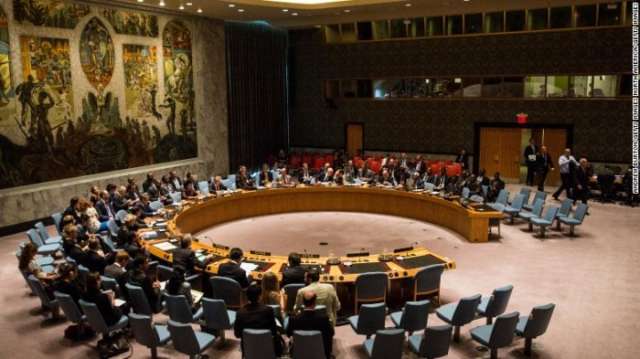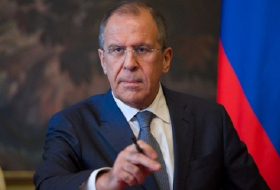Russia for once had the entire Security Council on its side, with the issue of the nuclear deal with Iran. The deal is under threat from the Trump administration, which may decide to withdraw from the agreement.
Lavrov said, "We cannot for the benefit of political agendas of certain countries abandon a genuine achievement of international diplomacy which was a crowning achievement."
Lavrov, a former Russian UN ambassador, warned the group of ministers and ambassadors, "Clearly the failure of the JCPOA (the Iran agreement), especially as the result of one of the parties of the five plus one, would be an alarming message for the entire international security architecture, including the prospects of dealing with the nuclear problem on the Korean Peninsula."
The linkage between dropping out of the Iran nuclear framework and the impact on persuading North Korea to sign on to a nuclear deal has been made repeatedly by not just Russia, but also US allies the United Kingdom and France, and many other Security Council countries.
Lavrov never named the United States directly, though the point was made.
He was not in his chair when Haley then spoke, attacking Tehran for violating UN resolutions through ballistic missiles and supplying military parts for rebels in Yemen to launch missiles at Saudi Arabia.
Haley charged that Iran "is the leading cause of instability in an unstable part of the world." She publicly named Russia for blocking the world from determining responsibility for chemical weapons use in Syria.
Haley said, "One nation stands in the way of the Security Council fulfilling its duty. That nation is Russia. It was Russia that vetoed three council resolutions that would have renewed the Joint Investigative Mechanism. It is Russia that has gone to great lengths at the Organization for the Prohibition of Chemical Weapons in the Hague to prevent the Assad regime from being held accountable for its actions. If the Russian government is serious about nonproliferation of weapons of mass destruction, it will convince its client Assad that he must eliminate his chemical weapons and cooperate fully with the OPCW (Organization for Prohibition of Chemical Weapons) and the United Nations."
Russian UN Ambassador Vassily Nebenzia sat and listened and waited per council tradition for the end of the session before returning fire.
"Given that Russia was mentioned by name, I will take the liberty to mention them by name -- the United States and the United Kingdom -- continue to manipulate the Security Council and the social sentiment of the international community. Perhaps their statements were written in advance and they did not have sufficient time to introduce their revisions having heard our statement. But no, this is being done deliberately."
Russian opposition forced the end of an inspection mission in Syria investigating who and how chemical weapons were used. Most of the attacks were blamed by the panel on the government of Syrian leader Bashar al-Assad.
Russia has said the panel was biased in favor of the West. The United States and allies felt Russia was simply distracting from potential war crimes carried out by Moscow's ally.
Nebenzia, his voice raised, said, "Stop your games with the OPCW. We know what the aim of these games is and demonstrate a willingness to establish a genuinely independent and professional mechanism if you need genuine cooperation rather than a smokescreen for political manipulation and then we will have trust in you -- that trust will then emerge."
Haley was not in the US chair to hear her Russian counterpart; instead it was a US political coordinator. The US mission to the UN said it was a scheduling issue. It is common at the Security Council for ambassadors to be replaced by colleagues during hourslong sessions filled with speeches.
As for attempts at confidence building, which was the theme of the meeting, the United States was unrelenting.
Haley blasted Iran for not complying with the terms of the nuclear agreement. She asked, "How can we promote confidence that states won't engage in the proliferation of weapons of mass destruction? The place we must start and the very minimum we can do is to insist that state comply with their existing obligations."
UN Secretary-General Antonio Guterres appealed for unity on the Iran deal, saying, "Global anxieties are the highest since the Cold War."
More about: #Russia #Iran #NorthKorea #Syria
















































